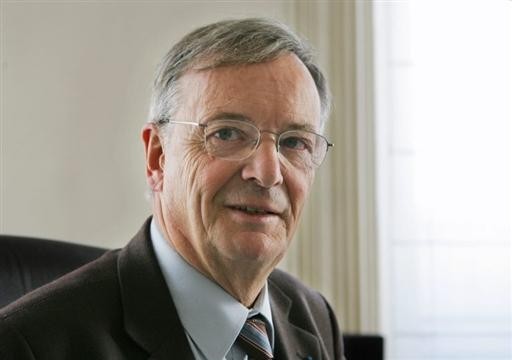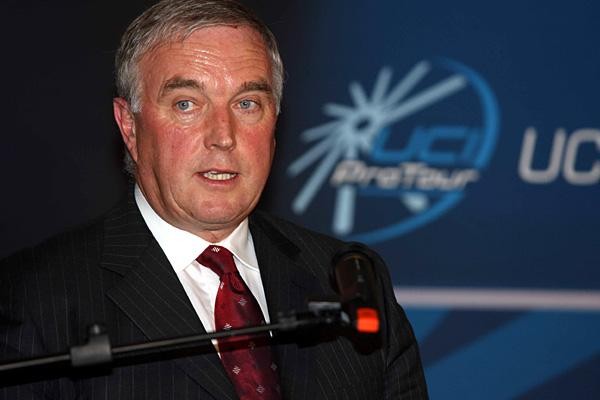Bordry floats possibility that new products could be in use
AFLD President also comments on on role of biological passport


With the Tour de France set to reach its conclusion this weekend, the President of the French anti-doping agency (AFLD), Pierre Bordry, has said that he is "neither reassured nor worried" about this year’s race.
Appearing to reserve judgement, the Frenchman said that he believes there are new products which might be being used in the peloton. "The UCI has agreed to keep the samples in order to perform a retroactive analysis," he told Le Figaro.
Bordry had earlier given an interview to the French paper in which he elaborated on his most recent suggestion that new doping products may be being used in the peloton. “Bernhard Kohl recently explained in L’Equipe that there are unfortunately still numerous riders who dope and who have adapted to the controls,” he stated.
"Information suggests that there will be new products in the Tour, new methods [of doping]. We know that from various sources, from the national authorities of neighbouring countries and also from those [riders] who are not happy to be alongside those who have doped. There will be new products that are actually older products that certain people think are no longer being tested for. Blood transfusions remain for us a difficult issue, autologous transfusions are hard to analyse for. But it is obvious that it will be possible to do that fairly soon."
He declined to name the substances in question.
In the same interview Bordry also commented on the UCI’s biological passport programme. He stated that while sees the biological passport as a valuable tool in the anti-doping process, he feels that its greatest use is in targeting. He doesn’t believe it’s the perfect solution that it has at times been held up to be. "The blood passport is a beautiful idea, in theory. I see that it is more suitable for targeting than for sanctions, it is not the ultimate solution. You can’t find everything in blood."
Bordry said that he is sure that there are also masking products that can hide the use of doping products, and said that this is why athletes selected for testing must remain under the view of the chaperones at all time. He gave an example of someone who tried to evade this, presumably to take a masking agent. "Last year, when [Riccardo] Ricco knew that he was going to be tested, he tried to escape before being blocked between two cars. And when the escort caught him, he had the impression that he was trying to carry out some manipulation."
Get The Leadout Newsletter
The latest race content, interviews, features, reviews and expert buying guides, direct to your inbox!
AFLD and UCI's Tour partnership back on track:
Bordry recently criticised the UCI for a considerable delay in carrying out a ‘surprise’ morning control on the Astana team of Lance Armstrong and Alberto Contador. The UCI controller spent nearly an hour having coffee with team officials before carrying out the test, theoretically rendering the examination useless. As manipulation of blood parameters is relatively quick and easy to do, current rules state that selected athletes should be under supervision prior to these examinations.
"It seems there's a bit of leniency when it comes to dealing with cyclists," he stated in a radio interview. "The UCI has a less professional approach. I'm not sure the same rules are being applied to everyone in the same conditions." The concerns were echoed by the French sport minister Roselyne Bachelot, who said that she wanted "to remind all parties of their responsibilities, in particular following the regrettable incident of last Saturday where the UCI displayed a certain laxness during the testing of the Astana team."
However, over a week later, the Frenchman appears to be satisfied with how things have gone since. "Everything is back to normal," he told Le Figaro. "After this incident Pat McQuaid took the right decisions. His close aides have taken the appropriate measures. Checks take place normally now."
No positives thus far:
In contrast to last year’s Tour, there have been no announcements of positive tests as yet. While there is a possibility that doping cases may yet arise, things are peaceful thus far. "There has been a very high number of testing done this year," said Pat McQuaid, president of the UCI. "The AFLD and the laboratory at Châtenay-Malabry are working flat out on the results. So far, there are no positives so far, and let’s hope it stays that way."
Unlike last year, when the AFLD had sole responsibility for drug testing at the Tour de France, this year the French anti-doping agency and the UCI are working in partnership. Pat McQuaid explained to Cyclingnews how the controls are being handled.
"The UCI is in charge of the controls. If we see something in there that looks suspicious and needs targeting, we will target that rider in the coming days. And if the AFLD have information that they want to target or have any desire to target a particular rider, they will ask us to do that and we will test them." The results are then sent to the AFLD laboratory at Châtenay-Malabry for analysis.